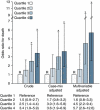Phosphate and FGF-23
- PMID: 21346724
- PMCID: PMC3257051
- DOI: 10.1038/ki.2011.27
Phosphate and FGF-23
Abstract
Fibroblast growth factor (FGF)-23 is probably the most important regulator of serum phosphate and calcitriol (1,25(OH)₂D₃) levels. It is secreted by osteocytes and osteoblasts in response to oral phosphate loading or increased serum 1,25(OH)₂D₃ levels. In human chronic kidney disease (CKD), plasma FGF-23 appears to be a sensitive biomarker of abnormal renal phosphate handling, as FGF-23 levels increase during early stages of kidney malfunction. In humans and animals with CKD, elevated FGF-23 levels increase fractional phosphate excretion, reduce serum phosphate levels, and reduce 1α-hydroxylase activity, which reduces 1,25(OH)₂D₃ formation thereby increasing parathyroid hormone (PTH) secretion. FGF-23 thus has a key adaptive role in maintaining normophosphatemia. Plasma FGF-23 continues to increase as CKD progresses, increasing by orders of magnitude in end-stage renal disease. At the same time, responsiveness to FGF-23 declines as the number of intact nephrons declines, which is associated with reduced expression of Klotho, the co-receptor required for FGF-23 signaling. In late CKD, FGF-23 cannot reduce serum phosphate levels, and abnormally high plasma FGF-23 concentrations appear to exert unwarranted off-target effects, including left ventricular hypertrophy, faster CKD progression, and premature mortality. Lowering serum phosphate levels through the use of oral phosphate binders and/or long-acting PTH agents may reduce FGF-23 levels in early CKD stages, thereby limiting off-target effects, which may improve patient outcomes.
Figures



References
-
- Coloso RM, King K, Fletcher JW, et al. Dietary P regulates phosphate transporter expression, phosphatase activity, and effluent P partitioning in trout culture. J Comp Physiol B. 2003;173:519–530. - PubMed
-
- Dominguez JH, Gray RW, Lemann J., Jr Dietary phosphate deprivation in women and men: effects on mineral and acid balances, parathyroid hormone and the metabolism of 25-OH-vitamin D. J Clin Endocrinol Metab. 1976;43:1056–1068. - PubMed
-
- Gutierrez O, Isakova T, Rhee E, et al. Fibroblast growth factor-23 mitigates hyperphosphatemia but accentuates calcitriol deficiency in chronic kidney disease. J Am Soc Nephrol. 2005;16:2205–2215. - PubMed
Publication types
MeSH terms
Substances
LinkOut - more resources
Full Text Sources
Medical
